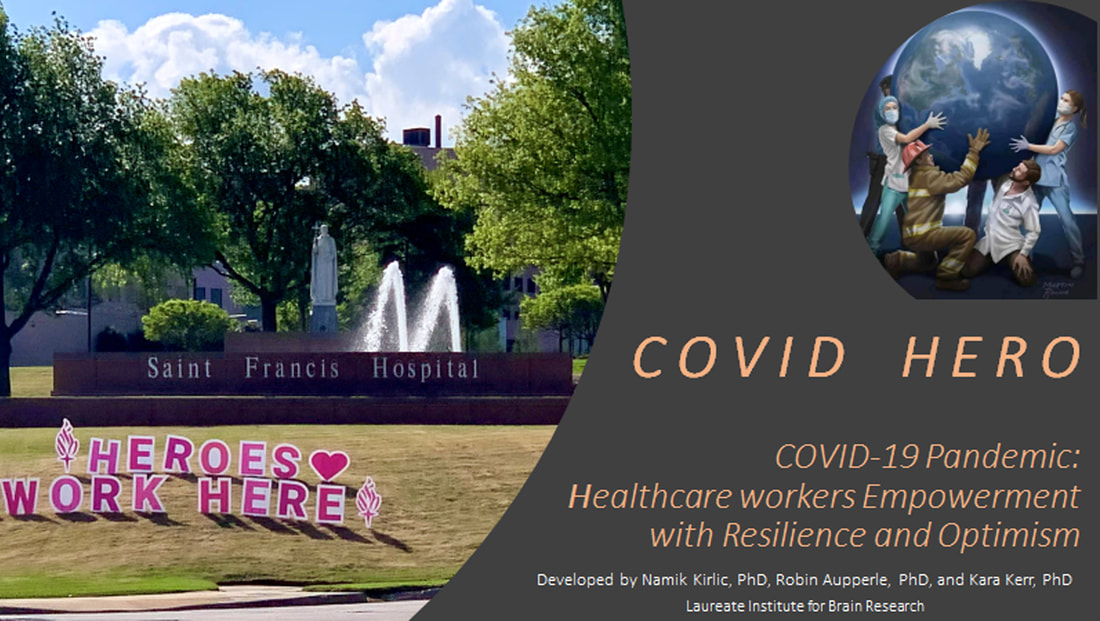COVID HERO Program: Healthcare workers Empowerment with Resilience and Optimism (HERO) during the COVID-19 Pandemic
The COVID HERO Program was developed during the COVID-19 pandemic by:
Namik Kirlic, PhD, Robin Aupperle, PhD, and Kara Kerr, PhD
Laureate Institute for Brain Research, Tulsa, OK
The COVID-19 pandemic taxed health care systems to an unprecedented degree and to exposed healthcare workers to high levels of stress. In such circumstances, healthcare workers may have experienced symptoms not unlike those that soldiers experience in battle, including anxiety, discouragement, and fatigue. Therefore, the purpose of COVID HERO Program, developed during the COVID-19 pandemic, was aimed at providing a program that equipped healthcare workers with skills for increasing their resilience and adaptive coping during a period of heightened stress.
The COVID HERO program consists of virtual skills training sessions, each lasting 1-hour sessions and lead by licensed clinical psychologists, specializing in assessment and treatment of anxiety, depression, and stress. Although sessions were recorded live in a group format, the recordings are made available to accommodate different shifts and increase accessibility. The information and skills provided are closely informed by Psychological First Aid and Skills for Psychological Recovery programs, which are evidence-informed guidelines for supporting individuals in the immediate aftermaths of trauma or disasters. Additionally, the training capitalizes on topic-relevant videos freely available on YouTube, but Drs. Kirlic, Aupperle, and Kerr, the Laureate Institute for Brain Research, or the Saint Francis Hospital System do not endorse any of the products advertised in these videos.
Namik Kirlic, PhD, Robin Aupperle, PhD, and Kara Kerr, PhD
Laureate Institute for Brain Research, Tulsa, OK
The COVID-19 pandemic taxed health care systems to an unprecedented degree and to exposed healthcare workers to high levels of stress. In such circumstances, healthcare workers may have experienced symptoms not unlike those that soldiers experience in battle, including anxiety, discouragement, and fatigue. Therefore, the purpose of COVID HERO Program, developed during the COVID-19 pandemic, was aimed at providing a program that equipped healthcare workers with skills for increasing their resilience and adaptive coping during a period of heightened stress.
The COVID HERO program consists of virtual skills training sessions, each lasting 1-hour sessions and lead by licensed clinical psychologists, specializing in assessment and treatment of anxiety, depression, and stress. Although sessions were recorded live in a group format, the recordings are made available to accommodate different shifts and increase accessibility. The information and skills provided are closely informed by Psychological First Aid and Skills for Psychological Recovery programs, which are evidence-informed guidelines for supporting individuals in the immediate aftermaths of trauma or disasters. Additionally, the training capitalizes on topic-relevant videos freely available on YouTube, but Drs. Kirlic, Aupperle, and Kerr, the Laureate Institute for Brain Research, or the Saint Francis Hospital System do not endorse any of the products advertised in these videos.
COVID HERO training focuses on:
- psychoeducation regarding causes and symptoms of heightened stress,
- personalization of strengths and coping strategies to rely on during extreme stress, and
- learning specific evidence-based coping strategies and skills to cope with acute stress.
The following sessions, except for Session 1, can be watched in any order and based on interests and the need of each individual. Although these sessions are designed to be helpful during the COVID-19 pandemic, the skill can be generally applied to other stress-inducing circumstances.
COVID HERO Training Program
|
Session 1:
COVID HERO Introduction In Session 1, we provide an overview of the purpose of COVID HERO and the resources available. Further, we briefly review demands that may increase stress and likelihood of negative reactions during the COVID-19 pandemic. Finally, we discuss individual responses to COVID-19 pandemic stress, and the specific skills training one might prioritize. |
Session 2:
Managing difficult reactions with mindfulness Session 2 focuses on difficult reactions to stress using mindfulness practice. We first identify distressing emotional reactions to different types of stressors. Next, we discuss and teach mindfulness practice skills to address these reactions. |
Session 3:
Enhancing positive emotions and meaning In Session 3, we discuss positive and negative mood cycles. We also review and work on selecting positive activities that might enjoyable for each individual. |
|
Session 4:
Problem-solving to enhance resilience In Session 4, we focus on skills to define and take ownership of difficult problems that we are facing. We then review skills on setting goals, problems solving solutions, and evaluating and choosing the best solution. |
Session 5:
Helpful thinking Session 5 focuses on identifying and discussing unhelpful thoughts regarding the current circumstances. We then teach skills on identifying thoughts that might be more helpful in coping with difficult current circumstances. |
Session 6:
Healthy connections during COVID In Session 6, we focus on building healthy connections during the COVID-19 pandemic. We begin by identifying how the current pandemic can adversely impact social support. We then teach skills on developing social connections and make a social support plan to improve and maintain social support during stressful events. |

